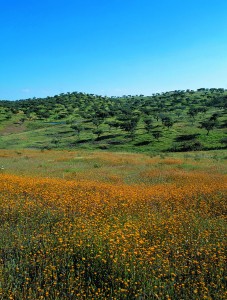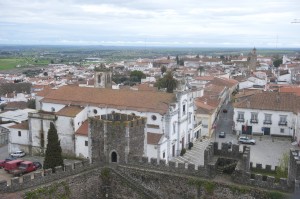
Alentejo Cornfields, Portugal
Journeying through the region, it’s the quiet pride in being exceptional that keeps coming through. Alentejans know that they possess something unique in their spacious, sweeping, green landscape. A visitor looking for dramatic panoramas or dazzling vistas would have to search elsewhere, as would anyone wanting instant entertainment; but if you prefer to use your eyes properly, to take the time to really look and see beyond the obvious, then Alentejo is the place for you.
Alentejo has the surprise of subtlety. The almost deserted coastline of uninterrupted white sand sweeps south and suddenly twists into jagged headlands at Vila Nova de Milfontes; you slowly become aware that among the vast acreage of cork trees inland are mounds of Neolithic Cromeleques; with little apparent evidence of Moorish heritage, you realise that the shape of the streets themselves are living testament to Africa, and that the battlements on top of the city walls are recent additions to disguise their Moorish origins. Almost a desert in summer for centuries, now the largest artificial lake in Europe at Alqueva has transformed the region around Beja into vineyard heaven, and you can share the excitement of enthusiasts and innovators – or even sleep on a boat under a star-filled sky.
Above all, Alentejo gives you the time and space to wander – the roads themselves are virtually traffic-free. Once the preferred home of the Portugese Royal court, abandoned palaces, monasteries and ducal mansions have been reinvented as sympathetic hotels. It’s not often you get the chance to sleep in luxury in a monastic cell, to be awoken by the sound of cuckoos among the jacaranda trees and the smell of freshly baked bread wafting from the kitchens.
In essence, Alentejo is an open canvas. Like its food, it offers unpretentious quality and intriguing delights. Convenient, accessible, and generous – make of it what you will.
Paul McKeever
Blogger






